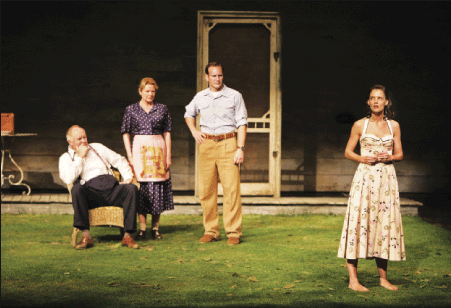By Scott Harrah
Fine acting can’t save this choppy, outdated production
ALL MY SONS
Directed by Simon McBurney
Limited run through January 11
Gerald Schoenfeld Theatre
236 W. 45th Street
212-236-6200; allmysonsonbroadway.com
“All My Sons” isn’t as renowned as Arthur Miller’s other classic plays. The tragic story, originally produced in 1947, right after World War II, has volumes to say about war and people who profit from it, making “Sons” somewhat timely. Much of the hype surrounding this powerful but flawed revival has focused on its all-star cast, with big names like two-time Tony winner and two-time Oscar nominee John Lithgow, two-time Oscar winner Dianne Wiest, two-time Tony nominee Patrick Wilson, and TV star and tabloid queen Katie Holmes. Unfortunately, British director Simon McBurney has difficulty getting these all-American actors to gel artistically in this quintessential American drama, and the play sometimes suffers as a result.
Miller’s moralistic melodrama about the emotionally fragile family of Joe Keller (Lithgow) – owner of a company that made defective parts for U.S. Air Force warplanes – is preachy and heavy-handed.
Joe’s wife, Kate (Wiest), is a woman in complete denial, convinced that her soldier son Larry, missing in action for over three years, is still alive. Son Chris (Wilson) spends a good portion of the first act trying to convince his parents that marrying girlfriend Annie (Holmes) is the right thing to do, and things really unravel when she suddenly arrives in town after being in New York for several years. The mother is completely against her son marrying Annie because she was Larry’s fiancé.
John Lithgow and Patrick Wilson have the most onstage chemistry as father and son. One of their last scenes – an argument that gets brutally physical – is especially riveting. Lithgow is superb as the stubborn father, and Wilson is marvelous as his aggressive, caustic son. Dianne Wiest is first rate as always, screaming, crying and emoting in all the right places. She delivers as the high-strung mother who refuses to accept reality, despite the fact that her family is deeply wounded and has fallen apart in every sense.
Theater novice Katie Holmes is a pleasant surprise. She doesn’t have anywhere near the level of experience of Lithgow and Wiest, but there’s no question she can act. She’s at her best when she’s playing Annie as a shrewd, quick-witted woman, but is less convincing in the play’s disturbing final moments. With better direction, her portrayal of Annie would have been more plausible.
Despite its topical messages about war and commerce, the narrative is mired in postwar language that isn’t relevant in 2008. The great American family tragedies of the stage, including Miller’s own “Death of a Salesman,” are classics that aren’t dated because they reflect the timelessness of family dysfunction. “All My Sons” has elements of Greek tragedy, but that’s also one of its shortcomings. We often see neighbors sitting offstage in the wings, many of whom come onto the stage at certain points like some bizarre rural American Greek chorus, but a touch that makes little sense.
In addition, director Simon McBurney adds annoying snippets of music, sound effects, and multimedia video montages of people walking down modern-day streets, all of which seem unnecessary and downright pretentious. High-tech projections of images to depict sets are a trademark of 21st century British directors. New Yorkers have seen them in such recent productions as last spring’s revival of Sondheim’s “Sunday in the Park with George” and in the 2005 Andrew Lloyd Weber musical “The Woman in White,” two shows also directed by Brits. However, technical gimmickry just doesn’t work well in an American classic like “All My Sons.”
The set is overly minimalist, and most of the action takes place in a front yard that could be anywhere in small-town America. The cast is forced to perform in front of a large, utilitarian façade of a house that doesn’t anchor the story well and is mostly used as backdrop with which to project video images of soldiers and wartime scenes onto the back of the stage.
“All My Sons,” with its ongoing themes about greed and the ugliness of war, may seem germane in the present-day world of economic crises and the conflicts in Iraq and Afghanistan, but at times it’s also far too shrill and thematically anachronistic for its own good. Regardless, it’s still worth seeing this remarkable cast of acting heavyweights doing some of their finest work. After the final curtain falls, “All My Sons” gets audiences thinking about the long-term impact of war on families, making it an unforgettable, important evening of theater.



































